#who was raised in an environment FILLED with manipulation and propaganda
Explore tagged Tumblr posts
Text
I can’t believe they failed Finn and Poe so completely in The Last Jedi and The Rise of Skywalker
Like Finn’s story could have been such a cool one to focus on..one that we haven’t really seen in star wars
Instead they chose to push a weird and uncomfortable copycat mix of the OT and PT stories with Rey and Kylo Ren
Idk it’s actually kinda incredible how badly they messed that up
#im actually fine with what they did to poe ngl#i just like him and wish he did more#actually no#he could’ve been treated better in TLJ#but what they did to finn#unforgivable#a force sensitive stormtrooper#who was raised in an environment FILLED with manipulation and propaganda#telling him to be on the evil side#but then when he is actually sent to do bad#he CHOOSES not to and immediately gets out#thats such a good story#why didn’t they focus on that#i dont even dislike rey#i actually REALLY like her#i think she’s awesome#in the force awakens i was so excited to see where they went with her story#but taking her from finn and pairing her with kylo was just DUMB#i didnt want her to be with finn romantically by the way#that’s important to specify#but i also didn’t want her to be with Kylo ren romantically either#she was just so much more fun to watch whenever she was hanging out with finn#dont get me started on the whole palpatine thing..or what they did to luke#kylo ren could have also been a great villain i wish they kept him as that#instead of a redemption arc and bringing back palpatine#if they just let kylo ren be EVIL i would have loved that#star wars#star wars sequel trilogy#finn and poe#kate's post
1 note
·
View note
Text
I see MCU!Khonshu as someone who is very, very familiar and knowledgable, not in an academic way, but more of street smarts that can only be gained though years and years and years of experience, as well as observation. And that does include being manipulative, the same way a street urchin learns to sweet talk his way through the harsh streets to avoid getting killed.
This guy, after his banished, would have roamed the earth for millennias seeing empires rise and fall, and all the bloodshed that comes inbetween. Genocide happens regularly in empire building and wars.
There is a sense of the nuance and grey area. Tribalism, nationalism, famine and desperation changes your relationship with other people.
How one paragon of heroism in one country, is a cruel, bloodthirsty and evil monster in another.
War heroes are glorified, but they got that by being murderous in the battle field. You know, killing alot of people. In wars, your perspective changes that the enemy is no longer a human like you, but degraded to just an animal to be slaughtered, a mere object that should be gone, or some evil you must defeat. Then you loose all empathy. And they either never feel guilt due to being raised in a place filled to the brim with nationalism/propaganda, or does feel guilty but go with it since they rather be the devil than let their family die in the hands of the enemy.
Then there are those evils within the society. An innocent victim can be so traumatized that he grows up to become a twisted and cruel serial killer who cannot be redeemed. Someone so gone beyond the point, it would be a mercy to just end him.
Serial killers, in reality, are not born but a product of years of abuse, violence, unhealthy environments that push them to a point of desensitization and desperation.
And I like to think that Khonshu first hand saw all these. Which makes it even harder, emotionally for him since he is seeing the crimes at a personal level but as an incorporeal being he can't really just bonk the bad guys away or whisk an abused kid away from their abusive parents. That would be kidnapping. Even if he did, there are more around the world.
And a horrible society isn't something that is easily defeated. You can't just punch poverty, racism, inflation, inequality, capitalism and bad governance. Not in a way that helps in the long run.
Like sure, kill a corrupt president, but without a good successor and actual supporters. This will only cause a power vacuum that will lead to a civil war, and more innocent deaths in between. Or the senators/rich who are just as corrupt as the president, will place a puppet leader. And nothing will change.
It's complicated and will get political. Khonshu doesn't seam like the kind of god to get involved with politics at that level. His own image isn't appealing to the public, at least one that matches the clean role model image that sells.
I can go on about capitalism, social inequality.
Then there's the economic impact. The lack of resources can and will result in wars, then it becomes become a death cycle.
You become a victim of a war, learn to fight, be violent to survive, kill a guy, that guy becomes a victim as well and also learns to be violent to survive, and so on and so forth.
A sense of tragic reality. You can't exactly please everyone. With how complicated societies can get, there is no perfect "hero" or "villain", nor the perfect "god" to worship or "demon" to blame every evils too.
A perfect society might preach a utopia but to get that means losing free will to choose, or employing draconian measures to maintain order. You become a mere puppet.
A demon might be blamed for an illness, but have you bothered with your unhealthy environment, your habits, hygiene, physical and mental well-being, the unhealthy fast food that you eat that lowered your immunity and lifestyle? Or are you just looking for a scapegoat than take responsibility and admit that you did this to yourself.
There is always more to evil than the black and white view that is common in some Western beliefs and fairytales. And I hope I can somehow convey that.
0 notes
Text
MODERN FIXATION
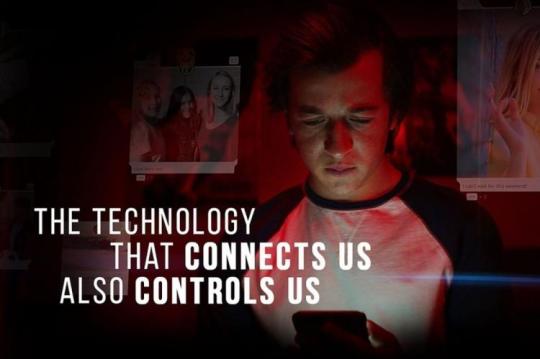
If you’re reading this, it’s too late. Your device has already taken you. It’s going to be up to you now how easy or hard it will be for you to fight the urge to stay on it. One thing is for sure, technology is inevitable. From the very moment you tried reading this, you were already enjoying the benefits of technology. You used technology to do something that you wanted. Besides, you wouldn’t even be reading this without technology. Everywhere you go, whatever you do, there is technology. Technology has already become an essential part of our everyday lives and whether you like it or not, social media is a huge part of it.
Now, social media is vitally useful in various ways. In fact, this is what helps us survive nowadays. Looking for jobs, finding solutions, deciding on what to eat, searching for a place to live, and most especially, getting connected with the people we know. Social media satisfies the needs of humans of having the desire of being part of something big. As a result of this, social media specifically produces identity that is akin to mob mentality allowing humans to be hyper-connected and unable to spend their time with real family and friends. (Koo, 2015).
For students like me, social media is a must. There is no way you can efficiently accomplish a group task without using social media. Students of today were raised in an increasingly media-rich environment. (Perse & Lambe, 2017). It is inevitable for them to use any form of media for communication, connection, research, and many more. However, this could lead students to the overuse of media for it will inevitably be part of their everyday needs. Social media users specifically Facebook users tend to admit their excessive normal, usual, or planned amounts of time online. (Koo, 2015) Certainly, social media users like me are unable to take control of their online activity; hence, leading them to have negative academic, professional, and social consequences.

Since technology plays an important role to me as a student, and to me as an individual, it is without a doubt that I need it every single day. With this, I can pretty much relate myself to the portrayals of young people using social media in the documentary The Social Dilemma. Even if it is not for the purpose of education, I still spend most of my time on my phone, if not, have my phone by my side, at all times of the day. This is because certain gadgets nowadays are most effectively and conveniently used for entertainment, communication, security, and most especially, for an emergency. Despite this, I grew up and was raised with the discipline to put limitations in everything. It has been part of the house rules that when we eat or when we spend time with family, we do not use our phones unless it is of great urgency and importance.
The documentary The Social Dilemma reveals an essential portion of what you need to know inside the digital space. You may not have known yet but technology is getting way bigger and more advanced than you could have ever imagined. Everything you see on social media, what you’re seeing now, what you’re reading, what you’re looking at – all these are just tiny fragments of what the internet actually is. The Social Dilemma presents you with the adverse effects of technology and how it can actually be used as a system of manipulation that leads people into believing something that is not true. Because of the freedom that we can access in social media, businesses and politicians tend to overexploit the platform which, in effect, they use to create false publicities and deceptive propaganda that results in an overall sense of illusion for the vulnerable users of social media. After all, social media itself is a form of business.
With the power of technology, I believe businessmen and politicians will continue to use it in the same way they are using it now. This is because technology has no limitations. As businesses, social media platforms earn through the running of advertisements. The only way they can grow their business further is to improve their method of revenue which is what they are doing now: use of cookies and personalization of advertisements. Anyhow, businesses need people and people need businesses. What makes the market mutually efficient for both parties is through the use of social media. As was mentioned in the documentary, people are the products of social media and that is how it really works. The time you spend on social media. which is the time you spend for your personal benefit, equates to earnings for the platform. Businesses will continue to advertise, whether it is for manipulation or promotion, because from the very nature of it that is how it works; this is explained by a common economic principle that nothing really is for free.

As for politicians, the spread of fake news and cyber propaganda is prevalent. However, I believe that it will not be as prevalent as what it is now in the future. This is because social media nowadays, especially Facebook, have developed a capability to detect news or articles that portray false news, misinformation, and any suspicious posts and activities. Facebook created Temporal Interaction EmbeddingS research (TIES) as an effort to improve its detection of fake accounts and misinformation and the enforcement regulations. This has enabled the company to eliminate more than 135 million fake accounts in April 2020. This may not have completely removed all existing fake news due to diverse engagement, but this serves as a stepping stone for Facebook and other social media platforms to build a system of rectification on the issue of information fallacies across the internet (Hutchinson, 2020). Therefore, yes, the politicians will still try to take advantage of technology in the future because they have the freedom to do so, but the movement has already begun for it to battle upon in this respect.

In the end, it may be beneficial for us to use technologies in our everyday lives but it is still part of our responsibilities to put certain limitations to it. Additionally, it is part of our due diligence to verify the information we encounter in the digital space. When you buy a certain product in the mall, you check whether it is fake or original before purchasing. This goes the same when you encounter articles, news, or any information on social media. You always have to verify the information before buying into it. This action must always be kept in mind when you browse the internet. Failure to do so can lead to detrimental repercussions that influence you and your decisions on life matters. Businesses and politicians will always try to play tricks on us but the only way we can push back against unethical practices of using social media is through our actions ourselves. Engaging our critical thinking skills and educating people about social media literacy are our best tools to defend ourselves from modern harm.
There are certain lines from the film that give a powerful impact. One of these lines is “If you’re not paying for the product, then you’re the product.” This statement is indeed agreeable. Like I said in the previous paragraphs, nothing is for free. Everything has an opportunity cost and trade-off which is an economic principle. Even when you say you have free lunch available at the canteen, falling in line to get it is the cost of it. This is why if you are not paying for a product, then you should already expect that something from you is taken in exchange. Another line from the film states that “There are only two industries that call their customers 'users': illegal drugs and software." To me, this can be associated with the same effect that comes with both industries: addiction. Both drugs and software impart chemicals that trigger the release of dopamine or our happy hormones from our brain. When we use drugs, our neurotransmitters from our brains detect a sense of pleasurable experience in which it changes the behavior of our brain in a way it increases the odds of us repeating the activity again and again; thus, it goes the same with our usage of the software.
There is another line from the film that I find to be agreeing with. It was the line that says “Social media is a marketplace that trades exclusively in human futures." This is evident from the many circumstances the film presented. The one reason why social media knows exactly how to keep you engaged on the platform is that they analyze your behavior pattern. And when they know the kind of behavior you have; they move on to advance their trading scheme. They sell your personal data and give them to large companies which is why there exist personalized advertisements as you scroll through your media feed. The last line from the film that hooked me is the statement: "The very meaning of culture is manipulation." Since our culture is filled with social media and the internet, it can be deduced that everything can now be tracked and monitored. People can now easily manipulate you into liking something or into having different sets of views, may this be in business or politics. As long as social media exist, so does manipulation. Our culture has become associated with the use of technology. It now depends on how we perceive information online that guides our beliefs and that what makes us who we are.
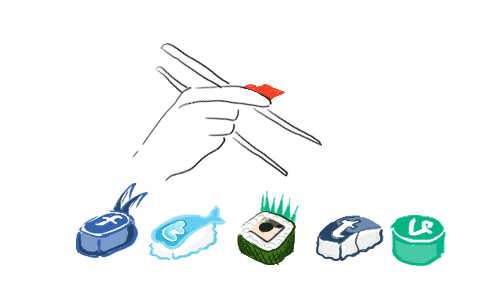
Personal SWOT Analysis Worksheet
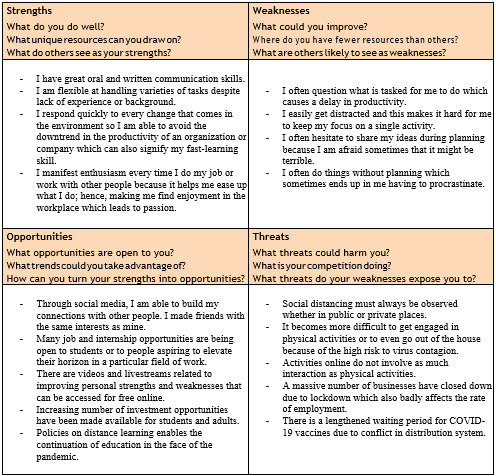
Illustrated above is my personal SWOT Analysis. I would say that the political, economic, and social factors are crucial to my growth. Because of these factors, I can determine steps that I can take to maintain my sanity and to improve on what I am lacking. The technological factors play a significant influence on the political, economic, and social factors found in both of my opportunities and strengths. This is because technology boosts everything around you, most especially in a time of a pandemic. Although I cannot go out because of COVID-19, technology allows me to stay connected with my friends and keep myself updated with the nation’s news. Because of technology, distance learning has been integrated into educational institutions to continue the delivery of education to all students like me. However, technology also contributes to factors under threats. Technological factors reduce personal interaction and increase the odds of people getting influenced by fake news considering that people, nowadays, turn to social media to obtain news.
With all the aforementioned circumstances, I would say that there are similarities and differences between my personal assessment and what the documentary, The Social Dilemma, says about the influence of technology on our lives. In a similar aspect, both my assessment and the documentary have presented significant improvements in daily lives with technology such as communication, research, broadcasting, data exploration, labor, and many more especially in a time of difficulty. On the contrary, both my assessment and the documentary presented adverse effects of technology specifically on our mental health and decision-making. This just goes to prove that technology is not always what it seems.

References:
Hutchinson, A. (2020, August 26). Facebook Outlines New System for Detecting Fake Accounts and Misinformation Based on Interactions. https://www.socialmediatoday.com/news/facebook-outlines-new-system-for-detecting-fake-accounts-and-misinformation/584228/.
Perse, E. M., & Lambe, J. (2017). Media effects and society. London: Routledge.
Koo, G. S. (2015). Lights and Shadows of Digital Technologies. Makati City: Church Strengthening Ministry, Inc.
2 notes
·
View notes
Photo
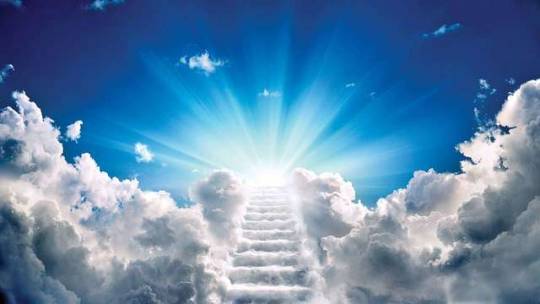
HEAVEN & HELL
By Nora Amrani
September, 1998
Most religions preach about heaven and hell, and how those who either do or do not believe in one thing or another will inevitably end up in one of these two places. What are hell and heaven? Are they real? Where are they? And who gets to go where?
Christianized Hell is portrayed as such a real and frightening place filled with monsters and Satan, where one is punished for their sins and suffers eternally. There is no way out. Oh, you know the pictures that have been painted by Dali and other artists depicting the burning pit where those not worthy of being recognized or loved by God are tossed, abandoned and tortured. Damned for eternity.
Heaven, on the other hand, is supposed to be eternal bliss. And only the very worthy end up in Heaven. With the stringent demands made on humans to be everything but human, (never mind seeing human as divine) while being constantly reminded that they are sinful and unworthy of heaven, heaven must be very under-populated. In fact, with all those rules to be met, I can't imagine one person being successfully led through those pearly gates! Can you? (No, not even Mother Theresa - she believed that she was less than divine, herself.)
FUN WITH ETYMOLOGY
Hell and heaven are very dramatically presented, aren't they? But do we even know what these words mean? Could it be we have all been fed non-sequiturs for centuries to the point where we no longer remember what these words really mean, therefore we live in constant confusion (like the Tower of Babel) because we don't properly use our language? Wow - just imagine what that does to our communcations on all levels with one another!
Hell: Prepare yourselves for a possible shock: The word 'hel' means 'light.' It also means 'earth.' Check your Germanic dictionaries if you don't believe me. In fact, check many languages and find the meaning of the word 'hell.' Some will say it means 'cover.' If hell is such a negative place, then why do we refer to the sun, who gives us life, warmth and nurtures us, as 'helios?" Perhaps the thought of diving into the sun would be hell, itself. Maybe that's how it all originated? But, realistically, you wouldn't even make it that close without first disintegrating. Ah, but then you'd become pure energy, pure light, just like the sun, itself! Your real essence, in other words. Why, we even used to worship* gods representing the sun's energy - Ra, ApolIo, for example. So, why would it be something to be feared and avoided, at all costs?
A 'demon in hell' can also be called a 'genius in the light.' Demon, or daemon, has conflicting meanings. It can mean our inner genius, divinity or genie. It is a word sharing the same root thing as 'diamond!' Some dictionaries say demons are inferior divinity or evil spirits. How can they be both? Both divine, genius and evil? Think about it. Do they not cancel one another out? Or, can we put all under one divine umbrella? What definitions have you been taught?
The horns on the devil are also used to depict great divine light emanating through the individual. Same thing was shown with Hathor, Moses, White Buffalo Woman. It is a positive symbol of higher consciousness and knowledge, not evil.
Devil comes from the Sanskrit world meaning 'deva,' which relates to the good angels of the Hindu pantheon. Were you taught that Satan means adversary or plotter? 'Adverse' meaning 'to turn towards?' After Zoroaster and the Persians conquered Hindu territory the conquerers miraculously transformed the Hindu gods into devils! So, the Hindu devas became the Persians devils.
If we look at the pattern of religious manipulation through language, the word "daemon" was changed into having a evil implication. "It was just more Christian propaganda used to brainwash the followers of the Greek and Roman religions into rejecting their old gods in favor of the newly created Christian character," as one scholar explains. This old ploy cunningly used good timing to coincide with the burning of millions of books; books which had they not been burned would have allowed people to see the truth of how they were being lied to. And the word 'evil' actually comes from the same root as the word 'apple,' which is 'upfel.' Who decided that apples were evil? The apple itself isn't evil.
Rabbi Ahron Lopiansky explains that Judaism talks of "Satan/devil," but it sees Satan as "...an agent of God, testing the sincerity of man's deeds, the strength of his convictions, and the stamina of his moral fiber. Although this so-called devil seems to entice man to do wrong, he is not inherently an evil being. Rather, he is conducting a "sting" operation; overtly enticing to bad, but in reality working for God. A cursory reading of the beginning of Job conveys that message: God sends out Satan to test Job's righteousness. Just as a dentist or doctor tests the firmness of a bone or flesh by probing it, just as the army tests the integrity and trustworthiness of its intelligence agents by tempting them, so too does God test man. A test reveals the inner worthiness of a person's deeds, demonstrating what they are really made of."
Heaven: Could this word come from 'heave' - meaning to toss, lift or raise? Those lofty ideas. No doubt it does. And what about 'heavy,' meaning 'weighty.' This can get to be lots of fun, eh? 'Ven' means 'air.' 'Ven' can also be 'van,' which means 'sail,' 'wing,' 'basket,' and it can be a shovel used in testing ore; and of course, it now means a type of large vehicle capable of transporting many people. The more accurate root of "heaven" comes from "haven." The word "heaven" also has its roots in Hebrew in "ha'shamayim," which means "the skies," " high places." Maybe you can come up with some other meanings for it. See the conflicts over and over in modern language?
Worship...another interesting word. "War" means literally "war," or "where," and "ship" meaning a "state" or "condition." The word religion is interesting, too. "Re" means "back," or "again," or even "in reference to." "Legion" is "a body of infantry in the ancient Roman army"; or "vast host." Re-legion. Armies of God in a war ship? Is religion about war? Or hosts of God?
Now that the brief etymology portion is over, let's get into the other areas of what these words have come to mean to a great many people in the religious and social sense. In fact, they have come to dictate and control much of our beliefs and lives.
AN ANCIENT STORY OF THE FALLEN ANGELS
The ideas of Satan and fallen angels are our own planetary collective consciousness' idea of viewing things negatively. One explanation is that it represents the fall of ourselves into this dimension of materiality and polarity, forgetting our divine selves and our spirituality. Satan is backwards for "natas" - which later became "nahash" the serpent. So, what everyone THOUGHT was evil, is actually the opposite. That term is related to the Sirian-Anunnaki being, Enki, in the following:
The archetypal, mythological concept of fallen angels originated approximately 450,000 years ago when the last of the extraterrestrial beings from a satellite planet named Nibiru, known on Earth as the Anunnaki, (a group of Lyran off-shoots who stemmed from one of their more infamous members, Anu, Enki, Enlil, Inanna, etc.), had their final expedition to Earth and, in a sense, left one group "stranded" here. Since the Anunnaki were known as "the gods," and these "gods" came from the heavens and were seen as being angels because of their amazing abilities and longevity. There were conficts between the Anunnaki themselves. Nefilim, or "those who came down," is another way of talking about this group of the Anunnaki. Some of the Anunnaki wanted humans to see them as God and did not honor free will. For this they were punished and expelled from certain galactic federations. This is where the idea of the fallen angels originally came from and various accounts of it are found in the Bahgavad Gita, the bibles and other cultural origin stories.
Enki was known as the serpent of wisdom, healing and life who had a great hand in creation, the waters of life (sperm, DNA, etc.) i.e., the Garden of Eden. Enki was frequently humanity's supporter. Biblical writers called the healing serpent Nehushtan. The Hebrew word for serpent is "nahash." The root of the word are the Hebrew letters Nun, Het and Shin, which means "to guess." This was translated into other languages as "satan," which some say mean "enemy," or "adversary."
Enki's identity, as Lord of Earth or In Earth (EN.KI), and EA (whose house is water) is reflected in other names, as well: Adonai, Aton, Aten, Adom, Adam, Amen. (Linguistic paleontology is a marvelous and vast area for proving these connections.) The name EARTH also comes from EA/Enki. Actually, the name "human" can be traced to Enki (a.k.a. EA) and his half-sister and wife, the chief geneticist Ninti (the mother goddess of all life). HU is a transliteration of the ancient Sumerian EA (Grimms' law of interchangeable letters and sounds). HU was also Horus, by the way. So a human is an EAman.
In India, the "nagas" were the serpent gods/goddesses. In the Americas there was Quetzlcoatl (Enki/Thoth). The entire world has worshipped the serpent for its wisdom, but ironically, it was not really about snakes at all - unless you feel you have to "guess" what a snake is up to! Why was the snake chosen? For its cleverness, ability to survive in the harshest of environments, and again, its shape resembling the flow of energy up the spine - to the crown chakra, and the third eye. And perhaps because it naturally instilled a bit of caution or awe in people. Was Enki really a snake? No, not literally.
THE REALITY
Both heaven and hell are places created with those of like mind and emotions - thoughts and feelings so intense that it creates a vortex of bioelectomagnetic energy so concentrated that it densifies and materializes. This material form can be ectoplasmic or physical. It takes on the form of the creator's beliefs. This form resonates with like energies, drawing them to one another. (Like attracts like.) This, then, creates a larger vortex of the same energy. And it keeps growing and building and desiring it's life to be continually fed. This, then, becomes a real gathering place.
Yes, heaven does exist. But it is a very complex dimension with many options. Many people experience it with the smell of flowers, with music, and always with lots of love. There is a gathering place for souls getting ready to make their transition from their physical form into spirit, and for those who have just crossed over. There are healing rooms. There are educational rooms. It offers freedom of choice to wherever your soul wants to learn and you plan your next move there.
Hell actually is a dimension of energy that is created by self-judgement and condemnation, ergo punishment. Its essence is fear and forgetfulness of love and light. It's energy contains fear, anger, powerlessness, (including guilt, martyrdom, pain, sadness), and it is a very difficult place from which to escape because it builds on itself. It is a very sad and dark place and even though there are many souls there, it feels so lonely. Ironically, the fear of being in what people believe to be hell may actually create that kind of hell, itself.
In the case of "hell," the only way these energies can be nourished is by having more of the same energy filling it up, adding more fuel to the fire. In order to stay alive it seeks out its food in many ways. Finding a weakness, such as addiction, within a person to attach itself to is one way. Attaching to the little bit of belief in that individual it can use for its own survival. And it can also be utilized by people performing certain rituals to get a life force that can be manipulated and directed. You see, the life force, the energy, never dies. It changes form, and its form can be intentionally changed. These energies will seek out others and build on itself unless we become conscious of them and choose to release them through other avenues. There are ways out of hell, but it often requires help from the other dimensions helping a soul remember love and personal empowerment, choice, freedom.
Be it heaven or hell, we create our reality through our experiences, our thoughts, beliefs, imagination, words, and our desire, and will. One way we can become conscious of how and what we create is through meditation, or going within and contacting the God within ourselves. We always have the choice whether to create our own heaven or hell wherever we are. And that creation begins nowhere else except from within ourselves.
21 notes
·
View notes
Note
Well in that case, let’s have 10-15 as well! It’s hard picking stuff that’s not already been revealed, you’ve done a hell of a job building the GA universe.
Hahaha, very good point! I have exploited the hell out of them. And I anticipate future exploitation will follow! And thankfully, these questions are much, much trickier to answer. So between this and the wrestling-watching commitments, this took me more than a day to compile~! But that’s a good thing since it was ultimately thought-provoking and I may or may not have stumbled upon a concept or two to utilize somewhere down the line.
10. What two songs, two books, and two luxury items do they take to a desert island?
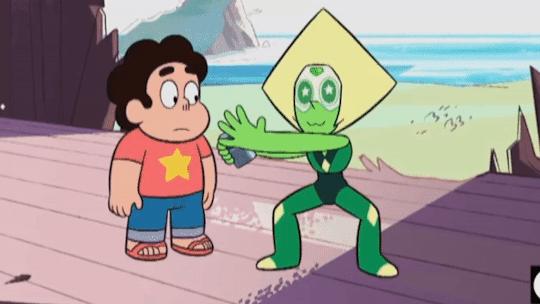
(my literal-minded self is assuming this is one item each; it’s also the crueler of the two interpretations, which is fitting)
At first I thought I’d have to force my mindset away from GAverse since this kind of set-up wouldn’t naturally happen unless Steven and Peridot really wanted to challenge themselves... then the movie happened and now there’s actually a very convenient way this could happen without GA Peridot trivializing this!

(of course, I’m uncultured trash, so the music and books make this the most challenging bit...)
Peridot is bringing her goddamn tablet, of course. Even without wifi, she can at least continue logging events the old-fashioned way... and this is one damn scenario where a daily log would be useful. At least until the battery runs out on that. Though I wouldn’t put it past Peridot to find a way to create a stable power source for that sucker. Making a lifeline for her tech would be Peridot’s #1 priority that isn’t related to keeping Steven safe and sound. :P She could also manipulate the metal in it to access hard-to-reach resources, if at a limited capacity.
I see Steven bringing an instrument, namely that damned ukulele. Simple mind, simple needs, and of course he’ll just see this scenario as an opportunity to actually teach Peridot some proper music lessons.
Music and books are where it really gets tricky. For books, Peridot’s getting something practical. So of course she’ll bring Lord of the Flies and claim that’s her guidebook to survival on a desert island. Steven is more for sentiment and bring that Sailor Moon manga we’ve seen him keep around in his room. Sailor Moon (the manga especially) is full of romance, so that suits his priorities perfectly, lol.
Similar case can be said for music: Steven will opt for a nice, mood-setting romantic song while Peridot brings the most loudest and obnoxious music known to her. Because logically, music like that stands the greatest chance in drawing outside attention so they’ll be rescued!
Peridot might be more lax about the ordeal if there’s steady food and water for Steven to survive off of; otherwise I see her largely panicking about being stranded in an environment where resources Steven needs to live on are finite.
(I’ll admit, I got the idea of Peridot and Steven doing a duet of this song (which I bet would sound way better with their VAs) while in this situation...)
11. What do they hide from one another?
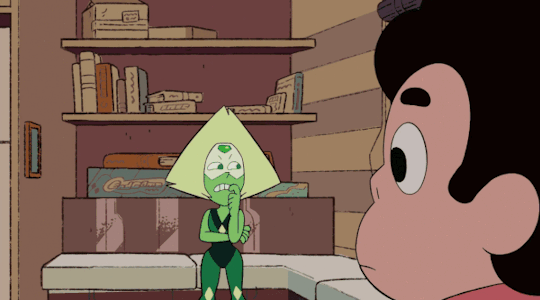
Now it’s GA Steven’s turn to trivialize the scenario! It’s officially nigh-on impossible for Peridot to hide one goddamned thing from Steven from GA3 onward... not that Peridot was ever that good at hiding shit from Steven to begin with.
In fact, a certain Post-GA story proved the only things Peridot truly can hide from Steven are secrets even she isn’t aware of, such as how exactly she first met Jasper and Lapis. The only reason Peridot was good at keeping that hidden from Steven was due to it being so traumatic that she made herself forget it in order to live with herself and move forward. So really, memories like that are the only things GA Peridot can hide from Steven at this point. There might still be a repressed memory or two, but overall she’s nearly out of stuff she could realistically withhold.
Outside GA, I feel like Homeworld has always been far more awful than it’s been made out to be, and Peridot would be the one who best knows just how awful life there can be. So if she’s hiding anything from Steven and has any prayer of keeping it that way long-term, it’s going to be the hell she used to have in her former life, or possibly the things she had to do to survive in said life. Of course she’ll still go out of her way to hide her insecurities and inferiority complex from Steven, but it’s practically a guarantee she won’t be able to keep that hidden for long.
Steven... is only slightly better about this. The fact that both suck at lying and maintaining a poker face, as brought up last time, really shoots him in the foot here. So I think I can answer for GA and regular headcanon in one go with him: anything related to Pink Diamond/Rose Quartz that Peridot hasn’t already learned about is probably gonna be stuff Steven keeps to himself about. He values Peridot so much as one of the only gems that has virtually no bias one way or the other about his mom, so the last thing Steven wants to do is fill Peridot’s head with the same “propaganda”, so to speak, that he and the rest of his friends have had drilled in their own heads for most of their lives.
Additionally more for GA, I think Steven possibly has more commentary about Peridot’s past life that he hasn’t already shared with her... but he’s going out of his way not to dredge up those old times. Especially when the Homeworld refugees will already be doing that for him on a daily basis (which logically would be why Steven would still be thinking about those times at all). After all the dirty laundry Steven has aired out in Peridot’s presence, I think he’d be keen on keeping anything still unsaid about their pasts/origins/heritage to himself solely for his girlfriend’s benefit. After all, Peridot being a uniquely fucked-up gem is still a pretty new concept that she’s still trying to adjust to. So Spinel’s gonna be a fun little addition to their lives in more ways than one!
12. What first changes when it starts getting serious?
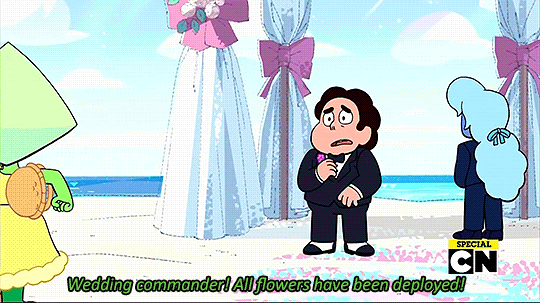
Hm, tricky to answer for GA, since it feels like they’re already at the “serious” phase of the relationship in these Post-GA stories. Realistically, though, Steven and Peridot are gonna have their hands full being the Era 3 centerpieces and have very limited time for dating or other romantic shenanigans.
Plus, the workload stressed these two out to the point that within 3 or 4 months in, they already tried going all the way despite both of them knowing they were being morons for resorting to that this soon. And consequently, as my most recent story confirms, they fucked up not only their first time, but also their reputation among their circle of friends... which consequently gave the two even less time to be together.
Taking that into consideration, it’s probably safe to say Steven and Peridot won’t even have the time to officially keep their relationship a steady one until Era 3 stabilizes. That said, by the following year when Steven turns 17, they should officially be in the “serious” phase considering they’ll be ready to really go all the way. And the first change made when it gets serious is either going to be a demand to the Crystal Gems to give them daily private time - or even better - Steven and Peridot get their own shared bedroom. I actually like that one more.
Otherwise, GAverse aside, I think the change that signifies Steven and Peridot getting serious... hmm. I kinda like the concept that they independently get the idea to propose taking their relationship to the next level and surprise each other when they unknowingly spring that announcement at the same time, having made each other a trinket of some kind for each other to mark the occasion. Then like dorks, they’ll announce this to the rest of the Crystal Gems and they’ll be like “uh yeah we saw this coming a mile away, dumbasses, congrats”.
I also like the idea of Peridot being more self-conscious of her appearance when the relationship becomes more serious, which makes her a little obsessive and experimental with things like outfits, accessories... and god forbid, make-up. Of course, Steven won’t care about any of that... but that won’t make Peridot any less determined to look the part of a serious girlfriend!
13. When do they realize they should get together?
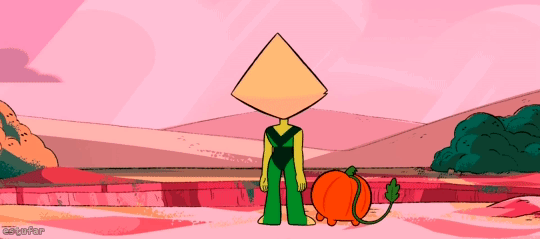
Definitely already a done deal in the GAverse as of Act III, Chapter 5. Had events played out differently, they would’ve officially been an item since the end of Act I. However, Steven coming back for Peridot even after she had given up hope of ever being rescued and being the one to fix her mind after White Diamond fucked it up royally - not to mention accepting her identity as Chartreuse, not giving a damn that she’s an abomination of scientific fuckery, or even that Peridot betrayed her friends (largely against her will, granted) - that makes for a more poignant moment when Steven tells Peridot that even after all the fuck-ups she’s made in Act III, that he still considers them boyfriend-girlfriend, and so should she.
So, thinking out of the box is trickier since we still have only a bare-bones grasp of what all’s happened in the time gap between seasons. Honestly, the most logical time for them to realize they should hook up should’ve been when Connie shunned Steven while Lapis abandoned Peridot. At the very least, any episode post-Raising the Barn should’ve been a golden opportunity for Steven and Peridot to realize how much they really love each other.
And since the movie was annoyingly heavy-handed with the Connvese teases with virtually no Stevidot interaction while season 6 as a whole is a still giant ? ... then it’s a matter of blindly grasping at straws to think when else they should hook up. We know they’re due for a bonding moment at some point in season 6, though. Hopefully it’s not about Lapis, but if it isn’t, I suspect it might have involve fusion... and I still like the headcanon of Peridot only being able to fuse with Steven due to being an Era 2. Not just an Era 2, but a type of gem that logically should never have a reason to fuse since peridots are not meant to fight. Their limb enhancers give them a means for self-defense, but that’s it. But some exclusivity with the fusion - plus Steven being the one to reassure Peridot that she’s not inadequate as a teammate (I imagine even in 2 years, she’s likely to be the weakest Crystal Gem).
14. When one has a cold, what does the other do?
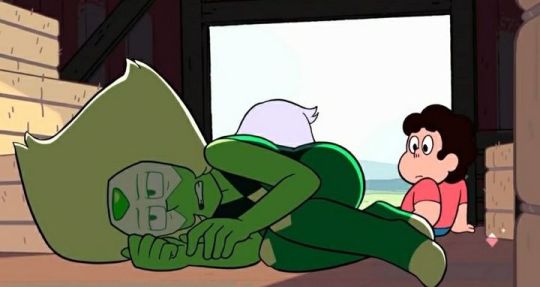
Welp! I guess for gems I’ll have to think of some kind of equivalent (I guess chipped/cracked/destabilized/corrupted... ooooor what’s expected of Peridot to deal with once she’s got buns in her oven?), but for Steven having the cold...
Well, whether it’s GA Peridot or Not-GA Peridot, they’ll behave similarly but one will have a much wider range of capabilities than the other. Not that this really means much for GA Peri in this field, since she has no real comprehension of what a human illness is like and therefore can’t just will Steven’s illness away. In both cases, Peridot would first seek help from the likes of Pearl, Greg, or Connie. If Peridot’s left to deal with this solely on her own, however, she’ll probably give Steven a thorough interview of every single little symptom he has, then use Google-Fu to get instructions that she’ll follow to the goddamn letter.
Hopefully she doesn’t come across an instruction worded in a way that she’ll interpret it in some other way entirely because she doesn’t understand the phrasing, because that could lead to chaos easily.
In the meantime, she’d ask Steven like every other minute if he needs something unless he’s asleep. And since Peridot has no innate understanding of this phenomenon, she’ll relentlessly study Steven’s mannerisms, symptoms, and actions until she feels she’s achieved enlightenment. That, or Steven gets annoyed and tells her to cut it out... though she may argue she’s constantly staring at Steven like a creeper for educational purposes.
She won’t leave his side regardless, though, and since she’s not at risk of catching his cold, Peridot’s of course going to snuggle with him all the same and volunteer to be his supplementary cushioning.
If Peridot is ailing... depending on what it is, Steven will similarly ask Pearl and probably Garnet before doing anything on his own if they’re available to him. Google’s not gonna give him the info he needs, of course, so Steven’s got a bit of a tougher job in keeping Peri healthy. Then again, Steven’s a motherfucking healing saint, so whether he’s GAverse or not, Steven could easily trivialize this since he’s basically the show’s white mage. GA Steven will have the advantage of being able to read exactly how Peridot is feeling, so he won’t need to interrogate her to figure out the source of her pain/discomfort/illness.
Of course, neither Steven would just observe her like a weirdo (like his girlfriend would, basically); he’d be right there for hugs and cuddles and wouldn’t dare leave Peridot’s side unless he really needs to use the bathroom. But even then he’d feel so guilty leaving her alone for even a second, so he’d rush it.
Steven might even be corny enough to try chicken soup on Peridot. And of course if there’s buns in the oven, Steven will treat Preggerdot like absolute fucking royalty.
Bonus: Accurate video representation of how Steven and Peridot will interact when she’s in labor
youtube
15. When they watch a film what do they choose and why? Who gets the final vote?
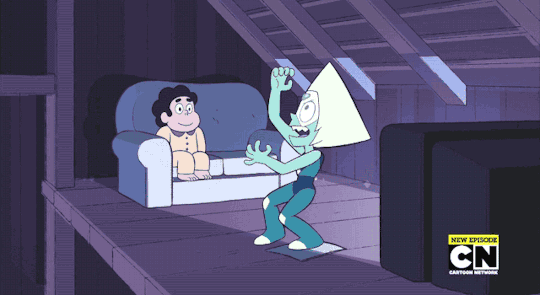
Something with good physical comedy; that way Peridot is more likely to get some entertainment out of it on a first viewing without having to ask Steven what the joke is while he explains it.
For some reason, I was thinking Liar Liar.
youtube
Since Peridot and Steven are so painfully transparent when they try to lie, they’ll feel much better about themselves watching something like this!
As for final vote, I think Steven would be the gentleman and let Peridot have the final vote. Peridot would likely think at least on some occasions that the final vote should go to Steven since he knows movies in general way better than she does (and therefore would have better overall judgment in what to pick), but Steven would just insist that he’s letting Peridot choose because since he trusts her instincts, she should, too.
There’s always a coin toss if they end up in a stalemate. :P And this would apply both for regular canon and GAverse.
Much more challenging round this time! Love it! I’ll always invite more questions, though at this point I may need to find some more memes to reblog, fff... here’s the meme if anyone still wants to snag questions from it and ask me from here!
Feel free to pass this headcanon BS to your fellow Stevidot peoples! There’s no such thing as too much content for this blessed ship.
#steven universe#peridot#su peridot#stevidot#gem ascension#answered asks#nice anons#shipping#ship meme
8 notes
·
View notes
Text
SOMETIMES THE PERSONAL ISN’T POLITICAL
How data made me a revolutionary
I’ve been going to church occasionally, with a friend of mine and her granddaughter. I wasn’t raised in the church and I am not a believer, but I am beginning to understand the value of gathering with some of your neighbors once a week, reflecting together and singing some songs.
It’s too bad, I now realize, that this version of church is so muddied up with all those other versions of church: the one where the church is a platform from which to manipulate great swathes of people into voting against their own interests, for example; or the one where the church is used as a battering ram against women and LBTQ people; or the one where the church turns out to be a massive pedophilic child abuse ring.
From the pew of my little church in New Orleans, I see the version of church that people love so dearly. I can see that it’s possible for the same idea to be at once a force for good in our private personal worlds, and a force for evil in our shared political world.
Some of our personal convictions work a lot better if they remain personal. When we try to make them political (i.e., attempt to apply them to society as a whole), they don’t achieve what we hoped and intuited they would, and sometimes they even hurt, instead of helping.
I think many of my liberal readers already embrace this idea, when it comes to Christian Republican convictions (”one man, one woman!”, “it’s a child, not a choice!”, “thoughts and prayers!”). But strap in, Lib Dems, cus I’ve got a piece for you, too.
THE ABORTION RATE DOESN’T CARE ABOUT YOUR FEELINGS
To further illustrate the concept, let’s talk about abortion.
If you really hate abortion, and you’ve never read any data on the topic, I can see how you might think that making abortion illegal is a good way to drive down the abortion rate.
Alas, it has been tried a number of times, and the data has revealed that it is not. The real-world result of banning abortion is not fewer abortions, but more dangerous abortions.
So truly noble-hearted pro-lifers (I’ve met some!) should face the fact that abortion bans are not good legislation. They are supposed to result in fewer abortions, but they don’t. Instead, they kill a bunch of pregnant women (which, I hope we can agree, is pretty anti-life).
Similarly, “abstinence education” does not result in fewer teen pregnancies, “thoughts and prayers” does not result in fewer mass shootings, and “building a wall” will not result in more jobs or less crime.
All of these ideas are “political” only in that they are being used successfully to manipulate voters. None of them is (or can become) a successful policy, according to our hardworking and underappreciated friend, data.
For contrast, here’s some data that could be really useful in policy-making, if anyone bothered to read it:
Countries with more restrictions on abortions tend to have higher abortion rates. When countries with legal abortion provide women with access to free birth control, on the other hand, the abortion rate plummets by AS MUCH AS SEVENTY-FIVE PERCENT.
Legalizing sex work has been shown to decrease reported sexual assault and rape by THIRTY PERCENT OR MORE. Providing safe online venues for sex workers to find clients (the opposite of the recent SESTA and FOSTA bills) has been shown to REDUCE THE FEMALE HOMICIDE RATE BY 17%. (Read that again. It’s insane. Now read this. Or, if you don’t feel like reading, just listen to this podcast.)
There are six times as many vacant houses in the US as there are homeless people, and it costs a ton of money to police the homeless population for nonviolent offenses. Why don’t we just give them houses?
Isn’t data cool?!???
This is why it’s a good idea to craft legislation and political strategies based on data, rather than on what feels intuitively or emotionally "right”. When we are unwilling to examine that distinction, we run the risk of 1) turning our adorable private beliefs (thoughts! prayers!) into ineffective, counterproductive, or dangerous political policy, and 2) ignoring data that can actually save lives, in favor of continuing to debate ideas that are politically pointless (eg: “is abortion right or wrong?”).
PLASTIC DOESN’T CARE ABOUT YOUR FEELINGS, EITHER
But guess what other ideas are personally adorable and politically pointless? “Don’t use straws”. Also “go vegan”, “buy organic”, “reduce, reuse, recycle”, and “impeach Trump”. Regardless of their intuitive or emotional impact, none of these ideas has a snowball’s chance in hell of addressing the problems they aim to address, and thus, as political strategies, they are more or less “thoughts and prayers”. Here’s why:
Worldwide plastic production is projected to increase by 400% by 2050.
Organic food still has a conspicuous lack of conclusive evidence for its benefits to health or the environment.
Despite the fact that vegetarianism and veganism appear to be trending in the U.S. and Canada, global meat consumption is on the rise and is projected to continue rising steeply (76% by mid-century).
That’s because the entire populations of the U.S. and Canada make up only 4.75% of the total world population (and dropping), with the world population expected to double by 2074.
(And, y’all, I hate to remind you, but impeaching Trump (almost certainly) gets us President Pence: an equally insane demagogue who is poised to enact possibly-even-more-terrifying policies.)
I’m not arguing that these ideas have no impact, or that they are bad ideas for you to apply to your personal life (e.g. if you have a Trumpian psychopath living in your household, you should certainly kick him out). I’m arguing that their impact on the problems they aim to solve is so immeasurably, impossibly small, that they will never get within a mile of the ballpark of solving them.
And that therefore, going vegan or eschewing plastic straws is in fact not a political act, but a personal one; like going to church, or getting a pedicure.
I’m not saying this to bum you out, or to judge you (I literally just got a pedicure). I’m saying it because when we pretend that “don’t use straws” is a political strategy, and will help us to address the life-threatening global crisis of ocean pollution, I think we are perpetuating a kind of confusion which could perhaps inhibit our ability to engage with these problems on the level of reality.
Which is, unfortunately, where most of us will have to continue living.
SCALE IS CONFUSING
The difference between political ideas and personal ideas is scale. The ocean, for example, is not a pool in your backyard (which you can simply refrain from filling with plastic). It’s a body of water which covers the entire planet, and is affected by all human activity. And “all human activity”, although it is made up of a bunch of individuals doing individual activities, cannot be accurately portrayed by the phrase “a bunch of individuals doing individual activities”. It’s better described in terms of human systems: institutions, governments, militaries, cities, countries, corporations and industries.
To approach these massive, complex, ocean-polluting systems as though they are a collection of individual people sipping beverages through straws is an ineffective tactic. So ineffective, it really can’t be called a tactic at all.
One way to determine whether something is a good tactic is to ask yourself: if this project was 100% effective, what would be the measurable result? Eg:
If 100% of humans stop using straws: ocean pollution will decrease by up to .025%
If 100% of humans switch to organic food: the environmental benefits will be mixed, and we will grow 25–34% less food.
That’s not to mention the fact that it is probably impossible to achieve a 100% effectiveness rate with ideas like these, because so far they are available to only a small subsection of people in a few very wealthy countries.
So, no matter how intuitively correct they may seem, at the scale of the entire globe (the scale where the oceans and the atmosphere exist), these ideas have roughly the same impact that “thoughts and prayers” have on mass shootings: they make a lot of people feel better about the fact that they are doing nothing to address a looming, life-threatening crisis.
If you ask me, we like to think that these ideas are politically effective for exactly that reason: because otherwise we will have to face the coming apocalypse of climate change, and the fact that humans on-the-whole are doing approximately jackshit about it.
And I understand why you’d want to avoid that! It’s fucking terrifying.
But my hunch is that we should instead admit that we’re doing jackshit about climate change, that the straws and the veganism and the potential impeachment were a waste of political energy, and that we are all absolutely terrified.
If we need to calm our nerves after that, we can go get pedicures.
And then perhaps, with a clearer head and calmer nerves, we can work on creating some actual political strategies.
YOU CAN’T CHANGE THE WORLD BY YOURSELF
Out here in terrifying reality, large-scale problems require large-scale solutions. And although it is intuitive to think that large-scale solutions are made up of lots of small-scale solutions (stop each person from using each straw!), it is sadly untrue. Complex systems – countries, economies, organisms – just don’t behave like a collection of small parts.
Similarly, major societal changes aren’t really made of a bunch of individual people making a bunch of individual changes. They are made of large-scale, long-term, coordinated applications of science, money, propaganda, and strategic organizing.
The right wing seems very clear on this fact, and uses it to great political effect (for example, we are still debating the “rightness” of abortion, despite its total irrelevance to policy-making, because they realized in the 1970s that debating abortion gets more people to vote Republican).
On the liberal left, though, I think there is some confusion about it. “The personal is political”, “think globally, act locally”, and “be the change you want to see in the world” get thrown around a little too frequently, and usually as advertisements for water bottles.
How quickly we forget that when Gandhi said “be the change” (which, by the way, he didn’t), he was probably referring to organizing millions of his countrymen in revolutionary acts of civil disobedience, towards a specific and well-defined political goal. He was not talking about buying a glass water bottle.
A relevant term to introduce here might be “phase transition”. A phase transition is when a system suddenly jumps from one phase to another. Boiling water is a good example: as you gradually turn up the heat on a pot of water, it just becomes gradually hotter water, until you get to 100C. Then, all at once, it becomes boiling water. And boiling water (in order to release the gas that the water is transitioning into) behaves very differently from hot water.
What we need to survive on this planet is not incrementally fewer straws and more Priora, it’s a global phase transition into an entirely different societal structure. And the individual consumer approach (“ask everyone to stop using plastic straws, then ask them to stop driving SUVs, then ask them to stop eating beef…”) is not just devastatingly slow, it is doomed to ineffectiveness.
It’s like trying to boil a pot of water by doling it out into Dixie cups and asking your friends to breathe hot air onto each individual cup. Intuitively, it seems like it might eventually work (the water is getting hotter, right?), but alas. No matter how good a job we each do with our little paper cups, the water will never boil.
If we want to boil the water, we need to pour all our cups into the same pot.
CANADA IS NOT THE WORLD
“But Canada is banning single-use plastic!”, you say. “Isn’t that a large-scale solution?”
Again, and unfortunately, it is not. Although “all the straws in Canada” is a lot more straws than “that one straw you’re using now”, it is still not even in the neighborhood of enough straws. The scale of plastic straw usage in Canada, when compared to the scale of plastic pollution in the oceans that span the planet earth, is just one more lukewarm Dixie cup.
The idea that Canada’s plastic ban is “a big win for the environment” only illustrates how resigned we are to losing. We are so resigned, we aren’t even capable of thinking about the problem at the appropriate scale.
If the Canadian single-use plastic ban has a 100% success rate, the oceans will continue to be 100% fucked by plastic.
That’s partly because there just aren’t that many Canadians. It’s also because consumer plastics are mostly not what ocean pollution is made out of (just like personal cars are mostly not what climate change is made out of).
And finally, it’s because everyone is not going to stop using plastic. Everyone is also not going to stop using petroleum-burning vehicles, or cows, or rice paddies. Everyone is not going to stop doing anything, unless and until the global industrial system allows us to do so.
We are still using petroleum not because we haven’t yet convinced each individual person to stop, but because the entire world economy is based on petroleum, and every powerful government on earth includes or is influenced by representatives of the petroleum industry. We are still using petroleum because the petroleum industry has its own lobbyists and politicians and spies and assassins and propagandists and governments.
We are still using petroleum because, at this point in history, the petroleum industry has a lot more influence over us than we do over it.
This may seem like bad news. But here’s the good news: we are not a bunch of individual people, facing a bunch of individual problems. We - the humans - have just one big problem. Our problem is that we have created a world where the petroleum industry is more powerful than any person, idea, government, or country. And so is the banking industry, and the tech industry, and the pharmaceutical industry, and the prison industry, and the war industry.
And all of these industries share one goal, to the exclusion of all others: profit.
Which means that most of the major societal changes happening on the planet are determined not by data, or democracy, or cute social media campaigns, or the pursuit of the greater good; but by the pursuit of profit, for each company, in each quarter.
And these companies and industries are so committed to that narrow goal - hogtied to it, really - that they are willing to hijack elections and start wars and crash the global ecosystem to pursue it. And all of us who share the planet with them - the humans, and the animals, and the oceans - are at the mercy of that pursuit.
The shorthand for this problem is “late-stage capitalism”.
When we are thinking on the global scale - which, again, is the only scale where we can have a measurable effect on the global phenomena of oceans and atmosphere - it becomes clear that the only way to tackle climate change at this point (having failed to do jackshit so far) is to fundamentally change the way the world works.
We need a phase transition.
But you don’t have to take it from me; take it from this team of independent scientists in their report to the U.N.
WE ARE ALL IN THIS TERRIFYING THING TOGETHER
If you’re a person who thought buying organic was a political act, I apologize. You’ve been duped. But it’s not your fault! The idea that our personal consumer choices have an impact on the global economy is not an accident. It is, in fact, a feature of capitalism.
It is good for capitalism when we believe that our personal choices are political choices, because it keeps us from focusing on large-scale problems and organizing to solve them (which, at this point in history, cannot be good for capitalism). Consumer-level environmentalism creates lots of new markets, while having no negative impact whatsoever on the industries that actually run the planet and profit off of its devastation.

If we want to start making political choices, we need to stop thinking of ourselves as heroic individuals, able to single-handedly stop climate change by buying a different phone case. We are part of the world, which is a small place, entirely and inseparably interconnected, and has one very big problem, which we can only solve together.
The big problem thrives when we believe that we are separate people facing separate problems. It thrives when we worry about ourselves, and our beliefs, and what kind of water bottle to buy. It thrives by keeping us distracted, divided, and self-interested.
The truth is, banning straws will not solve our problem, because our problem is bigger than straws. It’s bigger than plastic, and styrofoam, and carbon emissions. It’s bigger than AK-47s and abortion bans. Impeaching Trump won’t solve it, because our problem is bigger than Trump; in fact, our problem is even bigger than “men”.
There is only one man, his name is capitalism, and he’s got us all by the pussy.
SOME COOL DATA ABOUT SOCIALISM
I am a socialist, which means I think we ought to organize our societies around some motives other than profit. I don’t buy that the profit motive is particularly sacred or efficient (except at making profit - it’s very efficient at that), and I prefer almost all the other motives: creativity, kindness, lust, humor, fun.
I dream of a highly democratic post-capitalist society wherein politically-invested citizens make collective, data-driven decisions about how to allocate the resources of this one small planet that we share.
Before we get to the data, a few clarifying points:
I have scoured the internet for months, and I’ve finally found the best and most succinct summary of the difference between capitalism and socialism. Thank you, comrade Teen Vogue.
If you’re an American, you might’ve inadvertently ingested a bit of data-averse anti-communist propaganda in your lifetime. Just to check, read this fascinating and brief history of U.S. anti-communism (which, somehow, doesn’t even mention COINTELPRO).
And finally: no, the Nazis were not socialists.
“Socialism has never worked.”
According to the World Wildlife Fund, there is only one country in the world which is currently “sustainable” in terms of both human development and environmental footprint: Cuba.
Here is a comprehensive comparison of health outcomes for socialist vs. capitalist countries, using data from the 1970s and 80s. It finds that Cuba made significantly more gains than its neighbors in all available health indicators (life expectancy, literacy, infant mortality and employment), as did China (as compared to India) and the Soviet Union (as compared to West Germany and Austria). Cuba currently has the lowest infant mortality rate in history and one of the highest literacy rates in the world.
All of this is to say that “has never worked” is the kind of blanket statement that is designed to shut down conversations. In my opinion, there is a more productive conversation to be had by asking questions such as “in what ways has socialism worked and not worked? What about capitalism?”
“Authoritarianism! Gulags! Freedom!”
The United States (a capitalist democracy) currently has the highest incarceration rate in the world, with starkly disproportionate incarceration of black Americans. Currently, about 80% of U.S. prisoners are incarcerated for nonviolent crimes, and 22% of U.S. prisoners are awaiting trial (they have not been convicted or sentenced).
Israel is a capitalist democracy and a close ally of the U.S. In May, Israeli forces murdered 16 peaceful protesters and wounded 65, including children and paramedics. Exactly one year before, they killed 65 peaceful protesters and wounded 2,400. (For the record, I am a Jew, and there is nothing anti-Semitic about acknowledging the fact that Israel is currently engaged in a number of human rights violations.)
Then, of course, there’s slavery, the holocaust, the Trail of Tears, The Troubles, the Tuskegee Experiments, and compulsory sterilization, to name just a few. All of these acts of violence were carried out within capitalist societies, under the direction of capitalist governments. Is it possible that we are biased against the failures of socialism not because they are worse than those of capitalism, but because capitalism is the dominant paradigm? Is it possible we are experiencing just a touch of Stockholm Syndrome?
“Innovation! Entrepreneurship! Freedom!”
Cuba just invented the world’s first cancer vaccine, without a speck of venture capital. Actually, public (government) funding gave us most of the vaccines we use today (unless we are Jessica Biel); along with the internet, most of our aviation and space technology, the cameras and touch-screens on our phones, and even Google and Tesla.
About 30% of research worldwide is currently funded by public money (mostly government grants). Private money is not inherently more “innovative” than public money; the thing that spurs innovation is access to money, period.
And of course, there is the dark side of privately-funded innovation: the rising cost of insulin, the $750 pill, the possibility that a single company may one day own the entire food chain, and the likelihood that when it comes to research, there is a relationship between funding source and conclusion.
“But people are lazy! And there’s not enough food! And Soviet bloc housing is ugly!”
It doesn’t matter if people are lazy, we have robots. An Oxford study recently found that 47% of U.S. jobs (and around 13% of jobs worldwide) may be “lost to automation” over the next two decades. And many of our jobs are already bullshit: polls have found that 37% of full-time workers in the UK and 25% in the US are “quite sure that their job makes no meaningful contribution to the world”. Let’s step back a moment and consider the phase “lost to automation”; why is this a “loss” at all? Why aren’t we thanking the robots for allowing 47% of Americans to go ahead and be lazy? (The answer, my friends, is capitalism.)
We have more than enough food. Hunger is caused by inequality, not scarcity.
Speaking of inequality, I believe this line of panic stems from a gross misperception about just how much wealth the world has already stockpiled. The U.S. (for example) has quite a lot more money than Russia did in 1917; if we divided all the wealth evenly, each American household would have $760,000. That’s not to say we should do exactly that, it’s just to illustrate that this number is enough to provide quite a high standard of living for everyone - way higher than most of us are currently accustomed to. If the U.S. were to transition to socialism, there is no reason we couldn’t live in style with free healthcare, gorgeous homes, and delicious petri-dish meat.
So what is the actual objection, here?
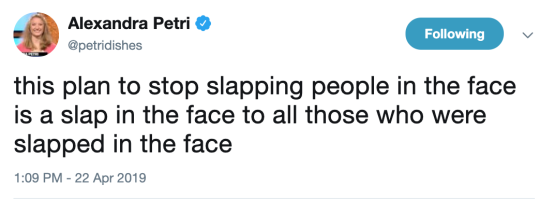
REVOLUTION: A PRACTICAL, DATA-DRIVEN POLICY IDEA
What all this data says to me is that capitalism has outlived its usefulness. More than 3 billion people on this planet already live in poverty; tens of thousands of children are dying each day from hunger and preventable diseases; we are currently seeing a global refugee crisis of unprecedented proportions, and it’s likely that 1 billion more people will soon be displaced by climate change.
The only political idea I’ve come across that will allow us to respond to so many crises of such magnitude is to stop doing capitalism. And I believe that a massive, strategic, well-organized movement of many millions of people can make that phase transition happen.
I know it seems impossible. But in the words of my late hero, Ursula K. Le Guin:
“We live in capitalism, its power seems inescapable. So did the divine right of kings. Any human power can be resisted and changed by human beings.”
Our only hope, at this late date, is to pour all our water into one pot. That’s what “organizing” is; that’s what Gandhi and Martin Luther King and Fred Hampton were doing, and that’s what we all need to start doing. I don’t think this blog post will launch a revolution (sorry, trolls), but I think it was worth writing, because it’s my opinion that American liberals - a huge voting bloc with a ton of money - will be considerably more useful to the revolution if we stop wasting our breath, time and political energy on straws.
If you agree, go make friends with your local socialists (I recommend PSL). Give them your folding money to spend on organizing, instead of blowing it at Whole Foods (so Whole Foods can turn around and spend it on union busting). Commit to educating yourself and others about how capitalism works, what it’s done so far, and what the alternatives are.
All of these activities will have more political impact than going vegan, AND you get to eat bacon.
Resources and suggested readings:
The Shock Doctrine by Naomi Klein
Why Socialism? by Albert Einstein
Why Women Have Better Sex Under Socialism by Kristen Ghodsee
The Dispossessed by Ursula Le Guin (if you prefer fiction)
Sorry to Bother You (if you prefer movies)
16 notes
·
View notes
Text
A Decade Away
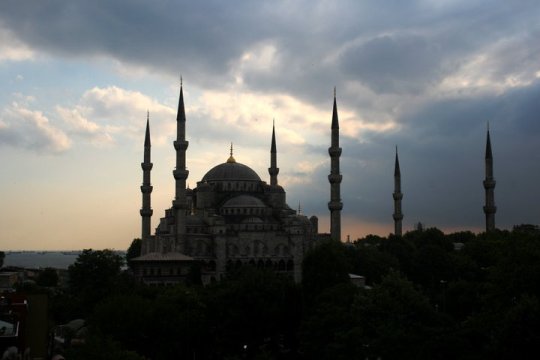
In August (which already feels like last year), I passed over an interesting date on my calendar, as on the 22nd – somewhat incredulously – I had been living abroad from Wales and Britain for ten years. A decade outside Europe. Ten years ago upon leaving, I had nothing to lose but a wide-open space in which to travel, discover and meet all variations of people, cultures and places.
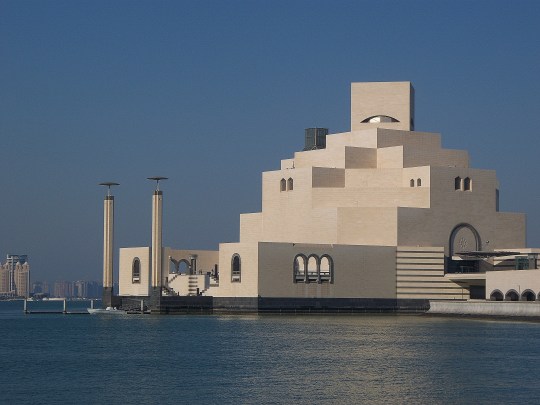
In this crazy time, I have lived on two continents, changed careers (a few times again); witnessed modern slavery, seen the remnants and after-effects of colonialism in new and old lands, learnt stuff, dropped habits, restarted those habits and dropped them again, realised what I missed while sacrificing those things for work; confirmed myself as an atheist, met someone in another land - who grew up, just a mile away from me – and married them; learnt more stuff - had young students die tragically, lost friends to cancer, worked under ridiculous conditions, made friends and lost acquaintances; had lots of surgery, seen equality rights improve but be violently opposed, seen my country finally qualify for a football finals tournament, owned my first dogs and love them like kids, seen the horrific, evil right-wing shadow cast over the world so bewilderingly subtle that I cannot recognise the world from ten years ago. And breathe.
As I pulled away from the glamour of Llanelli railway station on that date in August a decade ago; parents tearful (I was thirty-four and had left several times by this point – go figure); it seemed like the adventure it was about to become. Like the Lord Of The Rings story, I was to travel through some questionable places but alternatively - observe sights I wouldn’t have imagined. In my first hour of Doha life, seeing a woman in different attire to the usual Trostre car park attire in 2009 – ordering a shop worker around like a slave. “Get me this…get me that…” while repeatedly prodding his shoulder. Mind blown. Like I was watching a rich Caucasian American family from the late 1700s - jump to the 21st Century with their shopping techniques (Just to clarify - it was the manner and behaviour, not the attire which caused the bigger shock). The aisles of Asda in West Wales suddenly glittered with freedom. Yet somehow I stayed in the dusty, humid backward land for four years.
Not having record shops, comic or other book shops nearby – and the advent of a pub being a ‘membership only’ do – with very little else to do in Qatar, became a four-year strain. Although, the carnage of Friday brunch – paying the equivalent of £40-80, depending on the hosting hotel – for stuffing your face with all readily available food and guzzling sparking wine or beer for three-to-four hours until you stumbled out, into the hot sun – had a degree of rebellious sun about it. Away from the narrow lanes of daily Qatari constitution and archaic religious laws.
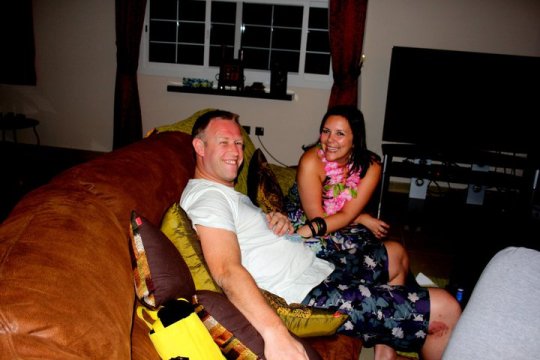
Realising that Melbourne was an escape route (by this time both Mr and Mrs Jones were infused by the travel bug – a return to Blighty was not an option), we visited the city in February 2013; kindly subsidised by Katherine’s future – and previous – employers. Our first encounter starting on a high street (for more than one intended pun reason) being that of intoxicated-to-oblivion bodies being dragged out of both McDonalds and KFC on a Friday night. Now this is more like home. High streets with open drunkenness and debauchery. Sign us up.
Not only that, but the self-appointed, clever social secretary – Mrs Jones – had organised what was to become my personal Australian favourite – its wine, through a vineyard tour of the Yarra Valley. If we could have been sold Melbourne – and Australia – any better in one week, I would be surprised. Plus the British and Irish Lions were touring here from June that year, so it could possibly be a dream come true, of seeing one of their test matches. It had to be Melbourne.

Of course, when you’re itching to leave a spiritually toxic place, yearning for a new social catapult in a new home – positives are mostly what you’ll see. Which is why living around the world – leaving the rough times with hope; expecting – or at least wishing for the rough to become smoother – it can be the most exposing and openly blatant aspect of life as an expat. Not knowing what will come next can be an exciting part of an adventure. It can also be of huge personal detriment should you not hit the ground running and settle into the new environment. While I have lived with immense pride at how my wife’s career has glowed in Melbourne, to say my working journey in Australia has been stop-start is like saying a Tarantino move ‘may contain violence’.
We can all live in a media-controlled bubble, wherever we are in the world. I would guess that most British people above thirty-five years of age would retain the idea that Australia is more alike the sun-drenched, ‘barbie’-having, beer-drinking eternal summers, as seen on Paul Hogan’s old adverts, Home and Away – as well as England’s Ashes tours are played in hot conditions. The thing with the validity of Paul Hogan’s Foster’s commercials – as good as they were, no-one in Australia drinks it. If it were the only thing available at a party, I’d have water. That’s always been my opinion of the uric juice. Australians have a joke about why they sell it to Britain because ‘Poms are stupid enough to drink it’. Thus, the irony and paradox of Foster’s being a symbol of Australia – it is not like Britain in the sun. You have to live here to know the hidden nuances. Sometimes, the hard way.
For instance, no-one would have told you that despite all your experience in certain industries in Britain – if you haven’t got “local” experience in Melbourne, then you won’t be employed (https://www.bbc.com/news/business-29206260). Hundreds of my unanswered job applications are testimony to that. Not many people can identify a Welsh accent. People will guess you’re Irish, English and Scottish - then run out of ideas of where else you could possibly come from. Rugby is not important in Melbourne (despite Australia having won the World Cup twice). Neither is driving or speaking fluently. Just abbreviate everything and end each word with an ‘o’. First world problems for graduates of an English and Culture degree, who still value their own culture and wonder why professional instructors are not mandatory in a Western, developed country.

First world problems or not – a decade later, third world problems seem to be entering the first world. Tomorrow, the general election of the four nations which are anything but united by royalty – and would certainly find it difficult to describe Britain as ‘great’ these days; regardless which side, fragment or definition of politics – you follow. It has become so depressingly divisive that it has split families – and societies right through those home nations. Politics across the world has become so murky and manipulative that no good comes of it. Social media, fake media, fake politicians, social tension – nothing is real. Apart from the poverty, confusion and disunity which has come from misinformation, lies and no real leadership.
When I left Europe, I wanted to find both myself – and my home. As mentioned, I had nothing to lose at the time – had my country been a thriving place, filled with opportunities – very much how Australians feel about their country – I may not have felt such wanderlust in my veins. I wanted to find my place. A place of belonging. In my home land, not only is it an industrial corpse which has become increasingly depressing to see its degradation in the past decade with each visit – but now won’t trust anyone so will seemingly vote for the ones who have harmed it most. If I really believed statistics being published this week about voting trends; Welsh voters now have lost their own moral compass and found a new level of Stockholm Syndrome, it would seem. My fingers are crossed to breaking point – in hope that those figures were nothing but propaganda. In 2019, anything is possible.

Wales – which has never had a Conservative majority – and rightly so considering its utter negligence of Wales - also now even being bandied as ‘West Britain’ by the future plans of the aristocratic parties, based in England – relies on tourism and the export of agriculture to survive. Universities help finance some aspects of the very few small cities we have, but outside of these urban entities, there is little growth. Considering the gentrification of larger cities (mostly in England) in the 2000s, isn’t it high time it happened in provincial towns?
The fact that some of my family – have told me they would probably vote Conservative this week – shows the predicament and alienation which is comparable to that of the 1930s in Germany and brought forth intolerance of racial and cultural variations. “Let’s vote for those who promise the most, have the least recent blemishes on their vague moral compasses – and hope for the best” – seems to be the strategy of casting a vote. The state of the NHS alone should be enough to veer the vote away from Captain Buffoon and his Blue Bigot Army. Elimination should be purely by track record, or by granting new chances. Not by being duped by rhetoric which will be forgotten in six months’ time apart from when a journalist raises the point - when it’s too late. Being loyal to your punisher is such a classist, British trait which seems to be perpetuated.
Now, at the end of the decade – it should be said that I probably still have little to lose. With no dependents apart from my little canine children, the next chapter now depends on what effects Brexshit will have on travel and work opportunities in Europe and the Northern Hemisphere. As an ex-teacher, hospitality pro and semi-professional DJ and producer – using the “anything is possible” to my advantage is the watchword. With social and international reasonability at an almost-anarchic state of suspended reality, the “one life, one chance” motto has to be imprinted on my mind.
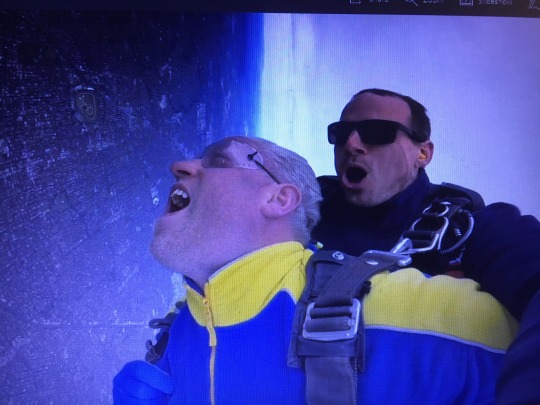
In my mid-forties, it feels like that the wanderlust needs to be summoned again. I’m finding it harder enduring bad road rules, taking orders from millennials who think they know everything, missing watching my teams at reasonable times, missing festivals which only happen up north, missing comedy such as Vic and Bob; time zone difficulties and being so far away from my interests, as well as friends and family. Coming to Melbourne with a completely open mind was something I’d repeat, should I head for a new habitat. Bearing in mind and researching cultural differences is definitely something I’d do, emphatically and thoroughly. The older you get, alarm bells ring louder with each situation. You just don’t want those bells to be a daily chime, after a while. So the most liveable place for me - would have an essential checklist of being – tolerant, multicultural, musical, a maximum of 3 hours’ time difference to Britain, with an effective infrastructure and not over-expensive. Now, where could that be?
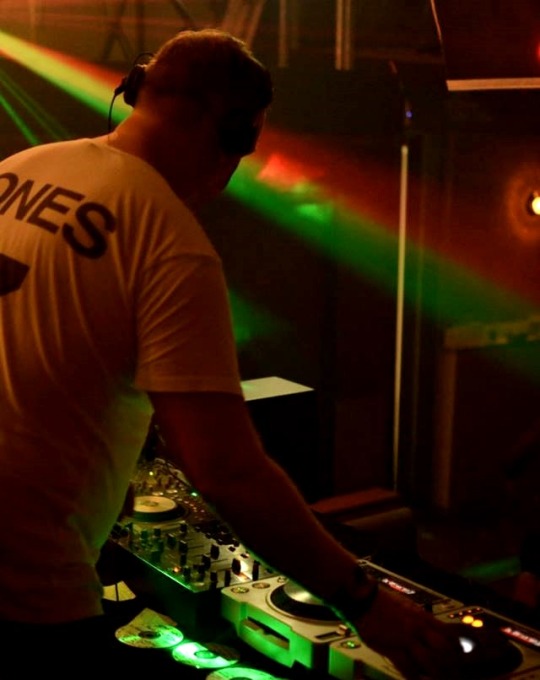
#expat life#abroad#politics#election#citizenship#friends#family#Britain#Wales#England#Scotland#Northern Ireland#Cymru#DJing#industry
0 notes
Text
In The Trenches
In the United States, we call it Veterans Day, choosing to remember not the end of war but the men (and women) who fought. In Europe, where the worst of "The Great War" was fought, they still choose to call it Armistice Day, celebrating not the act of fighting, but the act of putting an end to it.
It's been a century now since the armistice that gave the day its European name and meaning. We no longer have veterans to tell us how it was. There are books, some written during the war, most after. There are photographs and grainy, black & white movies, too, of men in trench coats up to their knees in mud, all of them waiting to go over the top into a line of machine guns or poison gas, one more futile gesture ordered by generals or politicians sitting comfortably far, far away.
What we do have from the "war to end all wars" are legacies. There are those trench coats, of course, and wristwatches and Kleenex and zippers. There are lines on the map, boundaries of countries all over the world written by a privileged few white men in palace ballrooms in the years following the cease fire.
And then there are the darker, or perhaps darkest, legacies: tanks, chemical and biological weapons, aerial dogfights and dropping bombs from the sky, and "total warfare", the tactic of attacking helpless civilians to strike terror into an enemy.
That last one was the first, but by no means last, import of colonial methodology for use on the colonizers. Decades of experimentation in Africa, Asia, and the Americas on weapons technology and population control were about to come home, offering a return to greatness to countries that had had their colonies and prestige stripped away from them in the years following 1918.
The idea that a domestic population should need to be controlled wasn't a new one. It wasn't the fascists who came up with it, or the communists or the capitalists. Nor was it the colonists or the imperialists who made a killing on figuring out how to kill more people, more quickly and then brought all they learned back to Europe, North America, and Japan.
The idea is as old as humanity, perhaps even older. As we've evolved, we've learned lessons about adapting to our ever changing environments, building cultural antibodies to improve our odds of survival. The downside of this is that the toxic elements of who we are learn, too. They also adapt. They also apply. They also get better at it.
The lessons come to them through the same means as lessons come to the rest of us, not just through books and movies, but through familial conversations, through lessons at school, and, mostly, through the culture in which they are raised.
If you have any doubt, take a casual glance at this year's elections and their aftermath. Men and women who have no interest in history or learning, who gladly belittle those who take an interest, have taken it upon themselves to use those same methodologies of a century ago, those same political tactics, to maintain their power, to maintain an underclass to serve their needs, and to maintain scapegoats on whom to blame all of life's failures.
Scapegoating was a big part of World War I propaganda. Make imagined enemies real and real enemies less human so they might be easier to hate and kill. It drove media coverage of the world leading up to the war and it drove men into the trenches once the war began.
A science grew out of it, finding what appealed to the masses to drive them to hate, and finding what appealed to the masses to get them to ask you to lead them. Mostly, it became about finding what appealed to the masses to get them to spend money on what you had to sell, but manipulation is manipulation, and long term consequences are unavoidable.
It didn't take long after Tuesday's elections for propaganda to rear its ugly head. With votes still needing to be counted, those with something to lose - primarily Republicans in close races and their supporters - began insisting that counting all of the votes was somehow un-democratic.
In Florida and Georgia, Republican candidates for senator and governor - including the now-former Georgia Secretary of State, Brian Kemp, who actively sought to suppress minority votes - accused their Democratic rivals of trying to "steal" the election.
In Arizona, where the Republican Governor, Doug Ducey, has defended counting every vote, John Kyl, whom Ducey appointed to fill out the remainder of the late John McCain's Senate term, has made the bizarre claim that counting every vote in urban areas such as Phoenix, which just happens to lean Democratic, "disenfranchises" rural voters.
The reality is that we do not have a single, infallible voting system in this country. This is a federal republic, with each county and municipality allowed to choose its own method of formatting and counting its own ballots. Each state is allowed to choose its own method of allocating election resources, such as what kind of voting machines and where they go, and its own method of deciding who should be allowed to vote.
It falls to us to be vigilant and report when cities, states, and the federal government fail to meet a basic standard of equality in allowing or counting votes, us and those we choose to allow to represent us, be they politicians, legal advocates, or journalists.
Which, naturally, leads us to the other great examples of propaganda from this past week.
That Trump chose to pick a fight with CNN's Jim Acosta at his press conference on Wednesday wasn't a shock. It may well have been why he held the press conference. Having lost about 20 more seats in the House than he was told his party would lose, Trump was facing the reality that life is about to get more difficult for him, not less.
For Trump, Acosta is a ready-made scapegoat: he is a journalist, he works for a network critical of Trump and his most violent supporters, and he has asked direct, challenging questions before. And, because it does matter, he is latino. So, of course, Trump used him to lash out against, both to make himself feel better and to distract from the rest of the day's - for Trump - bad news.
Trump went on to insult two black, female journalists, April Ryan and Yamiche Alcindor, both of whom also asked direct, challenging questions. Without any sense of irony, he ordered Ryan to sit down and shut up when she tried to ask about voter suppression, and Trump called Alcindor a "racist" for asking if calling himself a "nationalist" can be taken as a dog whistle by white nationalists (aka, white supremacists).
Flipping things back on a scapegoat is a classic bully tactic. Ryan asked about suppression and was silenced. Alcindor asked about racism and was called a racist. Why, Trump might as well have asked, were they punching themselves? He certainly wasn't going to answer their questions.
Acosta, for his trouble, was made the center of White House attention. After his dressing down by Trump, he was smeared with a doctored video by Sarah Huckabee Sanders purporting to show him striking a White House intern, a video she gave as evidence in order to ban Acosta from the White House.
That the raw video was already out and available for comparison didn't matter to her. That for the rest of America - those paying attention, at least - it turned Acosta into something of a martyr, didn't matter. Huckabee and Trump's audience isn't looking for facts. They want the propaganda. They want the distraction. They want another scapegoat, which is how they already saw Acosta. The White House attack only reinforces that.
What Trump's America doesn't want is to be held accountable. It's why they identify so well with him Being accountable runs not only against his policies but his entire campaign message. You don't have to be accountable to anyone, he promises, but everyone still must be accountable to you. The math on that never works, but it never has to. It's the lie they want to believe.
Which brings us back to Veterans Day. We are asked today to remember the sacrifice of men and women who chose to represent us, who chose to take risks on our behalf and, if necessary, lay down their lives so that we might live. Today, we are asked to hold ourselves to account for them, to respect not only their sacrifice but their willingness to put themselves on the line for others.
Those in the trenches one hundred years ago arrived there for many reasons. Some went for glory, others to defend an ideology, and others because the enemy was less than human. The truth is, how they got there ultimately mattered less than what they endured and what they sacrificed.
Those not among the millions killed came back scarred, literally and figuratively. Some came back deformed from explosions or gas. Others came back with what they called "shell shock", we now call PTSD. Some things never change.
What also never changes is this: The cost of war is paid, literally and figuratively, by those closest to the front lines, not by generals and politicians making decisions hundreds and thousands of miles away and reaping the benefits, and not by civilians too far from the realities of war to understand that those decisions are being made with their consent.
Those on the front lines of our current, domestic "wars" do understand that. The White House press corps, some of whom stepped in to defend their comrades on Wednesday, understand that all too well. The new generation of lawmakers elected on Tuesday understand it, too.
They're all in the trenches now, cannon fodder for Trump and his toxic cult of personality. Their risk may seem small, but the threats are all too real. Will we join them? Will we support them? Will we look back and understand their sacrifice in years to come?
- Daniel Ward
#Veterans#veterans day#armistice day#11/11#world war i#politics#propaganda#bullying#scapegoating#donald trump#jim acosta#april ryan#yamiche alcindor#racism#vote suppression#voter suppression#georgia#brian kemp#stacey abrams#florida#arizona#election day#long reads#long read#cnn#journalism#colonialism#imperialism#fascism#communism
0 notes